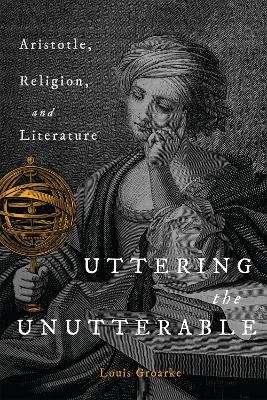
Uttering the Unutterable
Aristotle, Religion, and Literature
Seiten
2023
McGill-Queen's University Press (Verlag)
978-0-2280-1423-2 (ISBN)
McGill-Queen's University Press (Verlag)
978-0-2280-1423-2 (ISBN)
Uttering the Unutterable explores how we use literature as an honorific term to describe texts that are so overpowering that the encounter with meaning exceeds the capacities of ordinary language. Through a new reading of Aristotelian philosophy, Groarke identifies an experience of transcendence as the defining criterion of literature.
Literature utters the unutterable, not through logic, not through science, not through argument, but through a pitch of eloquence so pronounced the conscientious reader cannot fail to pay attention.
Louis Groarke argues that literature is an honorific term we use to describe texts that are so overpowering they lift us to an encounter with an ineffable ultimate that is beyond logical or scientific explanation. In Uttering the Unutterable he proposes a wisdom epistemology that identifies an experience of transcendence as the defining criterion of literature. Offering four mutually reinforcing definitions of literature in line with Aristotle’s theory of four causes, Groarke compares the experience of reading to Aristotle’s account of philosophical contemplation and maintains that literature has inevitable ethical content. Moving beyond the Aristotelianism of the late Chicago School, Groarke presents a new synthesis that breaks through essentialist stereotypes and contends that literature, like religion, points to an ineffable transcendental, to something beyond what we can adequately explain, prove, systematize, quantify, or enclose in a theory.
Uttering the Unutterable explores how Aristotelian philosophy provides the most complete and compelling account of literature for philosophers, literary critics, and theorists.
Literature utters the unutterable, not through logic, not through science, not through argument, but through a pitch of eloquence so pronounced the conscientious reader cannot fail to pay attention.
Louis Groarke argues that literature is an honorific term we use to describe texts that are so overpowering they lift us to an encounter with an ineffable ultimate that is beyond logical or scientific explanation. In Uttering the Unutterable he proposes a wisdom epistemology that identifies an experience of transcendence as the defining criterion of literature. Offering four mutually reinforcing definitions of literature in line with Aristotle’s theory of four causes, Groarke compares the experience of reading to Aristotle’s account of philosophical contemplation and maintains that literature has inevitable ethical content. Moving beyond the Aristotelianism of the late Chicago School, Groarke presents a new synthesis that breaks through essentialist stereotypes and contends that literature, like religion, points to an ineffable transcendental, to something beyond what we can adequately explain, prove, systematize, quantify, or enclose in a theory.
Uttering the Unutterable explores how Aristotelian philosophy provides the most complete and compelling account of literature for philosophers, literary critics, and theorists.
Louis F. Groarke is full professor in the philosophy department of St Francis Xavier University and author of An Aristotelian Account of Induction: Creating Something from Nothing.
| Erscheinungsdatum | 29.12.2022 |
|---|---|
| Verlagsort | Montreal |
| Sprache | englisch |
| Maße | 152 x 229 mm |
| Themenwelt | Geisteswissenschaften ► Philosophie ► Philosophie Altertum / Antike |
| Geisteswissenschaften ► Religion / Theologie | |
| Geisteswissenschaften ► Sprach- / Literaturwissenschaft ► Anglistik / Amerikanistik | |
| Geisteswissenschaften ► Sprach- / Literaturwissenschaft ► Literaturwissenschaft | |
| ISBN-10 | 0-2280-1423-9 / 0228014239 |
| ISBN-13 | 978-0-2280-1423-2 / 9780228014232 |
| Zustand | Neuware |
| Haben Sie eine Frage zum Produkt? |
Mehr entdecken
aus dem Bereich
aus dem Bereich
mit Sokrates, Seneca, Platon & Co. im Gespräch
Buch | Hardcover (2023)
FinanzBuch Verlag
CHF 25,20


